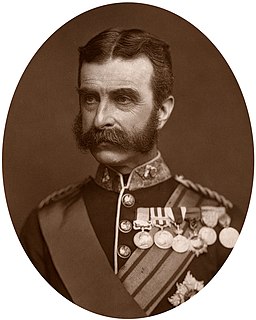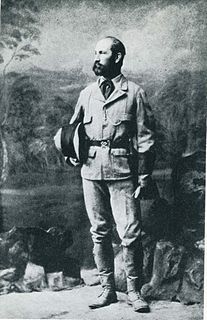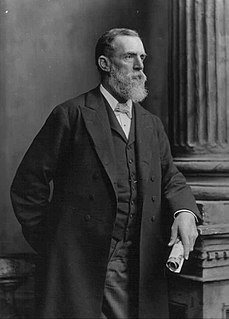Related Research Articles

The Anglo-Zulu War was fought in 1879 between the British Empire and the Zulu Kingdom. Following the Constitution Act of 1867 for the federation in Canada, by Lord Carnarvon, it was thought that similar political effort, coupled with military campaigns, might succeed with the African kingdoms, tribal areas and Boer republics in South Africa. In 1874, Sir Bartle Frere was sent to South Africa as High Commissioner for the British Empire to effect such plans. Among the obstacles were the armed independent states of the South African Republic and the Kingdom of Zululand.

Sir Henry Bartle Edward Frere, 1st Baronet was a British colonial administrator. He had a successful career in India, rising to become Governor of Bombay (1862–1867). However, as High Commissioner for Southern Africa (1877–1880), he implemented a set of policies which attempted to impose a British confederation on the region and which led to the overthrow of the Cape's first elected government in 1878 and to a string of regional wars, culminating in the invasion of Zululand (1879) and the First Boer War (1880-1881). The British Prime Minister, Gladstone, recalled Frere to London to face charges of misconduct; Whitehall officially censured Frere for acting recklessly.

Field Marshal Garnet Joseph Wolseley, 1st Viscount Wolseley, was an Anglo-Irish officer in the British Army. He became one of the most influential and admired British generals after a series of successes in Canada, West Africa, and Egypt, followed by a central role in modernizing the British Army in promoting efficiency. He served in Burma, the Crimean War, the Indian Mutiny, China, Canada and widely throughout Africa—including his Ashanti campaign (1873–1874) and the Nile Expedition against Mahdist Sudan in 1884–85. Wolseley served as Commander-in-Chief of the Forces from 1895 to 1900. His reputation for efficiency led to the late 19th century English phrase "everything's all Sir Garnet", meaning, "All is in order."

Estcourt is a town in the uThukela District of KwaZulu-Natal Province, South Africa. The main economic activity is farming with large bacon and processed food factories situated around the town. The N3 freeway passes close to the town, linking it to the rest of South Africa.

Frederic Augustus Thesiger, 2nd Baron Chelmsford, was a British imperial general who came to prominence during the Anglo-Zulu War, when an expeditionary force under his command suffered one of the severest defeats in battle against native tribesmen in the history of the British Empire at the Battle of Isandlwana in 1879. He went on to defeat the Zulu Kingdom at the subsequent Battle of Ulundi.

General Sir Redvers Henry Buller, was a British Army officer and a recipient of the Victoria Cross, the highest award for gallantry in the face of the enemy that can be awarded to British and Commonwealth forces. He served as Commander-in-Chief of British Forces in South Africa during the early months of the Second Boer War and subsequently commanded the army in Natal until his return to England in November 1900.

Christian Ferdinand Schiess VC was a Swiss recipient of the Victoria Cross, the highest and most prestigious award for gallantry in the face of the enemy that can be awarded to British and Commonwealth forces. He died in poverty at just 28.

Mtunzini is a small coastal town that is situated almost exactly halfway along KwaZulu-Natal's coastline in South Africa approximately 140 km north of Durban. In 2011, the town's population was 2,199.

Major General Sir George Pomeroy Colley, was a British Army officer who became Governor and Commander-in-Chief of Natal and High Commissioner for South Eastern Africa. Colley was killed in action, at the Battle of Majuba Hill.

Harry Escombe was a South African statesman.

The 1820 Settlers were several groups of British colonists settled by the government of the United Kingdom government and the Cape Colony authorities in the Eastern Cape of South Africa in 1820.

The Battle of Ulundi took place at the Zulu capital of Ulundi on 4 July 1879 and was the last major battle of the Anglo-Zulu War. The British army broke the military power of the Zulu nation by defeating the main Zulu army and immediately afterwards capturing and razing the capital of Zululand, the royal kraal of Ulundi.

The City of Ekurhuleni Metropolitan Municipality is a metropolitan municipality that forms the local government of the East Rand region of Gauteng, South Africa. The municipality itself is a large suburban region east of Johannesburg. The name Ekurhuleni means place of peace in XiTsonga. Ekurhuleni is one of the five districts of Gauteng province and one of the eight metropolitan municipalities of South Africa. The seat of Ekurhuleni is Germiston. OR Tambo International Airport falls in the Kempton Park area of Ekurhuleni.

Bulwer is a small town in the KwaZulu-Natal's Midlands region, South Africa. It is situated on the R617 regional road between the towns of Boston and Underberg and around 50 minutes north-west of the town of Ixopo on the R56. The village is nestled in the shadow of the Amahwaqa mountain.
There have been two baronetcies created for members of the Wolseley family, one in the Baronetage of England and one in the Baronetage of Ireland. As of 2018 the Wolseley Baronetcy of Mount Wolseley is dormant.

Sekhukhune I was the paramount King of the Marota, more commonly known as the Bapedi, from 21 September 1861 until his assassination on 13 August 1882 by his rival and half-brother, Mampuru II. As the Pedi paramount leader he was faced with political challenges from boer settlers, the independent South African Republic the British Empire, and considerable social change caused by Christian missionaries.
Lieutenant-General Sir John Plumptre Carr Glyn was a British general who saw active service in the Crimean War and the Anglo-Ashanti War.
Sir Henry Binns, KCMG was Prime Minister of the Colony of Natal, South East Africa from 5 October 1897 – 8 June 1899.
Major General Sir Geoffrey Barton, of the 7th Regiment of Foot, served the British Army from 1862 until 1904. Although he saw service in Ireland, Hong Kong and India, the majority of his campaigns were on the African continent. During the Second Boer War he was put in command of the 6th Brigade of the South Natal Field Force, taking part in the Relief of Ladysmith and the Relief of Mafeking. When he retired to Scotland he took an interest in local politics, the Red Cross Society and the Boy Scout Movement.

The Natal Mounted Police (NMP) were the colonial police force of the Colony of Natal created in 1874 by Major John Dartnell, a farmer and retired officer in the British Army as a semi-military force to bolster the defences of Natal in South Africa. When required the NMP would be assisted by the Colony’s volunteer regiments including the Natal Carbineers. It enlisted European officers, NCOs and natives and men of the NMP fought and died in the Battle of Isandlwana and at Rorke's Drift during the Zulu War of 1879.
References
- ↑ enquiries@zulu.org.za. "Old Government House" . Retrieved 2018-09-07.
- ↑ tinashe (2011-04-01). "Durban Timeline 1497-1990". South African History Online. Retrieved 2018-09-07.
- ↑ 1833-1913., Wolseley, Garnet Wolseley, Viscount, (1971). The South African diaries of Sir Garnet Wolseley, 1875 : Edited with an introduction by Adrian Preston. Preston, Adrian W. Cape Town: Balkema. ISBN 0869610090. OCLC 233639404.CS1 maint: extra punctuation (link) CS1 maint: numeric names: authors list (link)